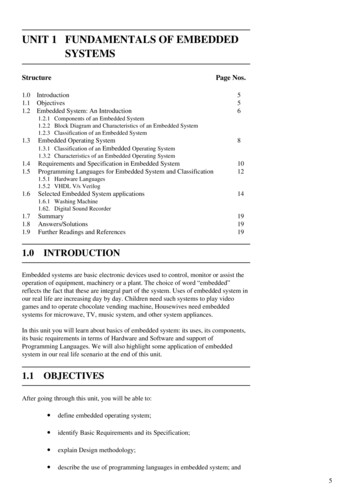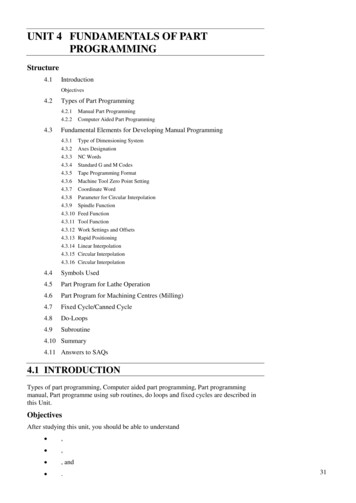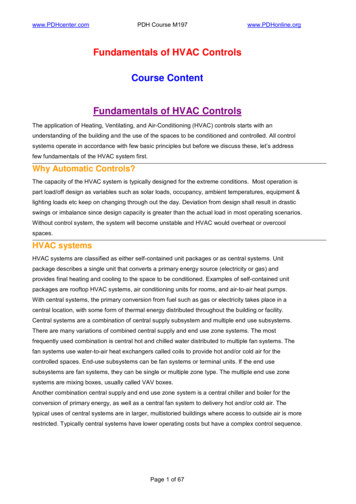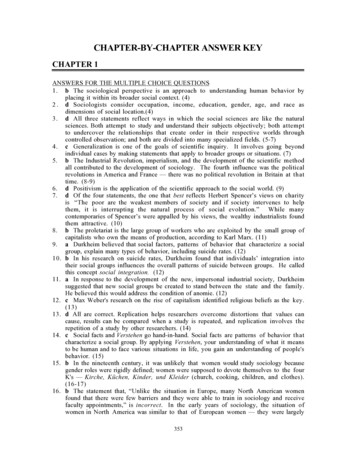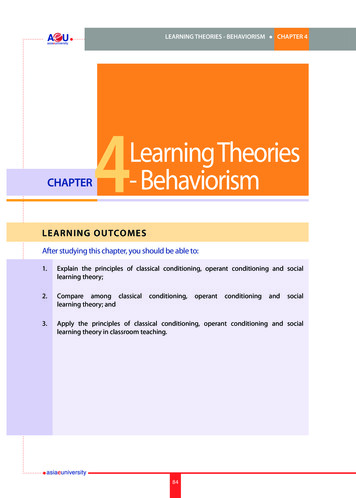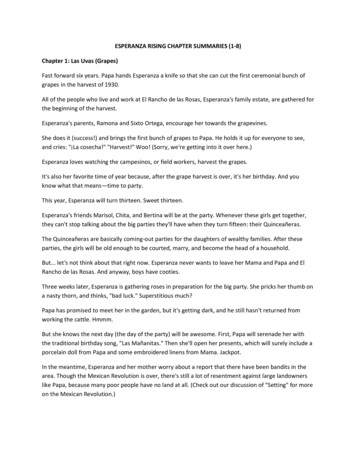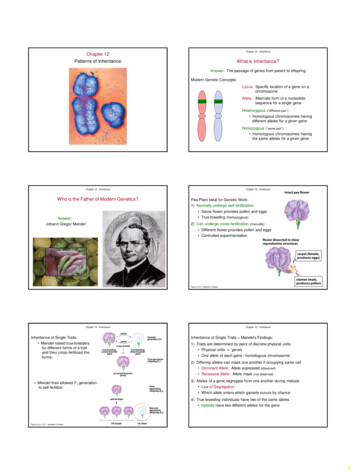
Transcription
FUNDAMENTALS OF PERSONAL FINANCIAL MANAGEMENT G ET O N BASECHAPTER 1HEADLINETextFUNDAMENTALS OFPERSONAL FINANCIALMANAGEMENTGET ON BASE1
We are independent financial advisors. All information contained in this workbook is solely our opinion.This workbook is for general information only and is not intended to provide specific investment advice orrecommendations for any individual.Managing your employer retirement program(s) and the analysis associated with decision-making aboutpersonal financial matters is unique to each individual. You should use the information presented to helpyou focus on the factors that are most important to you.Waterworth Wealth Advisors, LLC, Kestra Investment Services, LLC, and Kestra Advisory Services, LLCdo not provide legal, tax, or accounting advice. Before making decisions with legal, tax, or accountingramifications, you should consult appropriate professionals for advice that is specific to your situation.Securities offered through Kestra Investment Services, LLC (Kestra IS), member FINRA/SIPC. Investmentadvisory services offered through Kestra Advisory Services, LLC (Kestra AS), an affiliate of Kestra IS.Waterworth Wealth Advisors, LLC is not affiliated with Kestra IS or Kestra AS.
FUNDAMENTALS OF PERSONAL FINANCIAL MANAGEMENT G ET O N BASETABLE OF CONTENTSCHAPTER 1INTRODUCTION LETTER 04CHAPTER 2OBJECTIVES 05CHAPTER 3“Every day is a newopportunity. You canbuild on yesterday’ssuccess or put itsfailures behind andstart over again.That’s the way life is,with a new game everyday, and that’s theway baseball is.”Bob FellerBaseball Hall of FamerWorld War II Navy VeteranASSESSMENT: KNOW YOUR NUMBERS 06CHAPTER 4RISK MANAGEMENT:DEFENSE 16CHAPTER 5IMPORTANCE OF FINANCIAL PLANNING 23CHAPTER 6RETIREMENT PLAN BASICS 26CHAPTER 7ASSEMBLING A TEAM 28CHAPTER 8CONCLUSION 36CHAPTER 9RESOURCES: USEFUL WEBSITES 383
FUNDAMENTALS OF PERSONAL FINANCIAL MANAGEMENT G ET O N BASECHAPTER 1INTRODUCTION LETTERThis workbook is designed to serve as a guide to those in career transition who want togain a better understanding of their financial picture. During a transition, it helps to knowyour financial position, good or bad, so you can manage your money and job searchstrategy appropriately until the next door opens. Whether you are getting ready to start anew career or looking forward to retirement, there will be many personal financial tradeoffs to evaluate when making decisions about your future. This workbook is intended togive you fundamental tools and information to support your decision-making process.The decisions you make today can affect your financial well-being for the rest of your life!Therefore, devoting time to evaluating your financial position and options for action iscrucial. It can elevate your immediate job search by identifying baseline requirements forsalary and benefits. In addition, it can help you process the economic side of the bigger,strategic questions you are likely working through, including but not limited to what’snext for your career and what the end game for your lifetime of work will be.A trusted financial advisor can provide a clearer view of the range of available optionsand trade-offs for your unique situation. We believe a better personal financialmanagement experience begins by putting your big picture into focus with a thoroughunderstanding of your needs, wants, and goals, as well as the resources you have toachieve your objectives. We know of no better way to gather, organize, and analyzethis information than the financial planning process.For some, the subject matter may be a bit dry. To make this information moreaccessible, consider a baseball-themed analogy. Why baseball? Well, there are manysimilarities. The objective of personal financial management is to achieve your financialgoals, which for many include financial security during retirement and not outlivingyour money. In baseball, in order to win, players must score by safely arriving at homeplate; and on defense, they need to make plays and avoid errors. Finally, it takes a teameffort to win the game. In this guide we offer you the fundamentals of personal financialmanagement, which include knowing your numbers, effectively managing risk, andavoiding errors, as well as assembling a team that will help you win the game of personalfinancial management.Play ball!Timothy J. Waterworth, CFP , AIF 04
FUNDAMENTALS OF PERSONAL FINANCIAL MANAGEMENT G ET O N BASECHAPTER 2OBJECTIVESThis workbook is intended to help you sort through important personal financialmanagement decisions often encountered before you enter retirement. Whether youare closing in on your retirement years or not, it is important to assess where you arefinancially relative to your goals in order to make appropriate plans.In the context of financial planning, goals are planned expenses occurring in the future.Examples of financial goals are buying a home, sending a child/grandchild to college,traveling in retirement and ultimately not outliving your money! The objective of financialplanning is to help get you on track to confidently achieve your financial goals.The learning objectives for this workbook are to ensure you know how to find help whenyou need it, to support good decision-making, and to provide valuable information andtools for you to understand and assess your financial circumstances.Objectives:1Complete a Personal Financial Assessment to identify and prioritizetopics that warrant your attention.2Gather and organize your financial data into basic financial statementsso you can assess your position and streamline getting assistanceshould you need it.3Assess and manage risk while balancing the cost of beingadequately protected.4Identify useful resources and tools to manage personal financial mattersand find good advice during all stages of your financial journey.05
FUNDAMENTALS OF PERSONAL FINANCIAL MANAGEMENT G ET O N BASE06CHAPTER 3ASSESSMENT:KNOW YOUR NUMBERS“Baseball is the onlyPERSONAL FINANCIAL ASSESSMENT 07field of endeavorWORKSHEET – BUDGETED EXPENSES 09where a man canWORKSHEET – CASH FLOW STATEMENT 12succeed three timesWORKSHEET – BALANCE SHEET 13out of ten and beDEBT MANAGEMENT 14considered a goodUNDERSTAND WHERE YOUR MONEY GOES 15performer.”Ted Williams“The Greatest Hitter Who EverLived”, Baseball Hall of Famer,World War II Navy and MarineCorps Veteran
FUNDAMENTALS OF PERSONAL FINANCIAL MANAGEMENT G ET O N BASECHAPTER 3PERSONAL FINANCIAL ASSESSMENTAnswer Yes/No to the following questions. If you answer Yes, great! But does yourinvestment, estate, and financial plans align with each other (i.e., no conflicts or gaps)?If you answer No, you have some research and investigating to do in this area!Financial Planning FoundationI know my monthly budget and where I can reduce expenses if needed.I have a personal balance sheet and know my net worth.I have an adequate emergency fund to cover 3-6 months of living expenses.I know how long my severance and savings will sustain me before having to tapretirement accounts»» WWA BLOG: CAREER TRANSITION FAQ – SHOULD I PAY OFF DEBTS NOW OR LATER?Managing Employer Retirement Plan BenefitsI understand my choices for managing employer retirement benefits (i.e., 401(k),pension, stock options) critical timeframes and potential tax impact of each.I have established specific retirement income and other financial goals.I have a plan to achieve my goals and periodically monitor my progress.Investments in my 401(k) are invested according to my goals, risk tolerance,& time horizon.I have evaluated my 401(k) funds for performance and reasonableness of fees.»» WWA BLOG: SIX POTENTIAL 401(K) ROLLOVER PITFALLS»» WWA BLOG: ECONOMICS OF BORROWING FROM YOUR 401(K)07
FUNDAMENTALS OF PERSONAL FINANCIAL MANAGEMENT G ET O N BASERisk ManagementI understand my health insurance options to include COBRA and the health insurancealternatives available to me under the Affordable Care Act and in the private market.In the event of my, or my partner’s, untimely death; my dependents would be able tomaintain their standard of living and still realize long term goals (college & retirement).Arrangements are in place should I, or my spouse, need long-term care (livingarrangements, long-term care insurance).I have software in place to secure, back up, and protect my online and digital files(encryption, cloud storage, virtual private Wi-Fi network, antivirus software, etc.)I take adequate precautions to protect myself from cyber-security threats.»» WWA SURVIVORS FINANCIAL CHECKLIST»» WWA TECHNOLOGY SECURITY AND IDENTITY THEFT PROTECTION CHECKLISTEstate PlanningI have a current estate plan in place (wills, trust, directive to physicians and durablepower of attorney).Beneficiary designations on my retirement accounts and life insurance policies are currentand aligned with my estate plan.»» WWA BLOG: IS IT TIME TO UPDATE YOUR BENEFICIARY DESIGNATIONS?Competent HelpI have a financial advisor whom I trust and value.I have an estate attorney I trust and value.I have a CPA I trust and value.I have a health insurance professional I trust and value08
FUNDAMENTALS OF PERSONAL FINANCIAL MANAGEMENT G ET O N BASECHAPTER 3BUDGETED EXPENSESMonthly BudgetAnnual BudgetDEBT SERVICEMortgageAuto Payment(s)Student Loan(s)Credit CardsSubtotalTAXESIncome TaxCounty TaxSchool TaxSubtotalHOMEElectricityWaterGasPhoneCable TVInternet Service ProviderHome Repair/MaintenanceHome SecurityPest ControlLawn ServiceHome FurnishingsHome ImprovementsSubtotal09
FUNDAMENTALS OF PERSONAL FINANCIAL MANAGEMENT G ET O N BASEMonthly BudgetAnnual BudgetCAR ingSubtotalINSURANCELife – HusbandLife – WifeMedical - FamilyDental – FamilyHome InsuranceAuto(s) Doctor vestmentsRetirementSubtotal10
FUNDAMENTALS OF PERSONAL FINANCIAL MANAGEMENT G ET O N BASEMonthly BudgetAnnual HolidaysSubtotalENTERTAINMENTDining OutMoviesBabysitterSports TicketsClub DuesChildren’s ActivitiesSubtotalPERSONALGym/Personal TrainerHair TAL11
FUNDAMENTALS OF PERSONAL FINANCIAL MANAGEMENT G ET O N BASECHAPTER 3CASH FLOW STATEMENTMonthly IncomeMonthly ExpensesSalaryDebt ServiceSeveranceTaxesUnemploymentHomeFinal WagesCar ExpensesVacationInsuranceSick OTALCalculate:1Income – Expenses Monthly Surplus or Deficit2 Savings / Current Income Savings Rate3 Debt Service/ Income Debt Ratio4 Income - Taxes Net Income5 Net Income – Non-discretionary Expenses Discretionary Income12
FUNDAMENTALS OF PERSONAL FINANCIAL MANAGEMENT G ET O N BASECHAPTER 3BALANCE SHEETAssetsLiabilitiesLIQUIDMortgageCash & EquivalentsCar LoanInvestmentsStudent LoanOtherCredit rsonal PropertyRetirement AccountsReal EstateOtherOtherTOTALCalculate:1Assets – Liabilities Net Worth2 Liquid Assets / Monthly Deficit (aka Burn Rate) Months Until Liquid Assets DepletedIn career transition, it is helpful to know how long your severance and savings will sustain you. Knowing yourburn rate and the runway you have before taking more drastic financial measures can be useful motivation in acareer search and in the evaluation of job offers.Once liquid assets are depleted, then what? You can: Sell assets Take on debt Tap retirementaccounts13
FUNDAMENTALS OF PERSONAL FINANCIAL MANAGEMENT G ET O N BASECHAPTER 3DEBT MANAGEMENTIf you find yourself in career transition, cash management is king. The duration of yourjob search is probably uncertain, and creditors will be unlikely to extend credit to youuntil you are reemployed.It’s a natural urge to want to pay off debt when in transition. However, it may be better topreserve your cash and keep making payments against debt as scheduled. This extendsthe amount of time you have to secure your next opportunity without having to take moredrastic measures such as tapping retirement accounts, selling assets, or taking on moredebt.Debt management tips during transition include: Pay off high-cost debt (credit cards) if you have sufficient cash. For longer-term loans with lower fixed rates, maintain this debt in place and staycurrent on your payments. Decide if you want to pay them off or refinance themafter you land your next opportunity. If you get into a financial pinch and cannot meet your debt repaymentobligations, contact your lenders to make them aware before you miss anypayments. If you have student loan debt and are strapped for cash, try reducing orsuspending student loan payments by submitting an unemployment defermentrequest to your loan service provider.14
FUNDAMENTALS OF PERSONAL FINANCIAL MANAGEMENT G ET O N BASECHAPTER 3UNDERSTAND WHERE YOUR MONEY GOESThe surest way to build wealth comes down to one simple habit: spend less than youearn. It sounds easy enough, and nearly everyone has a good handle on his or herincome; however, keeping track of what you spend and where your money goes can bechallenging.Understanding your cash outflows is critical to your financial health. It allows you todetermine where you may be able to cut your costs and what you have available toinvest. It is also the basis for estimating your future needs and accurately predicting yourfuture financial status.Thanks to technology, tracking where your money goes is no longer th
The objective of personal financial management is to achieve your financial goals, which for many include financial security during retirement and not outliving your money. In baseball, in order to win, players must score by safely arriving at home plate; and on defense, they need to make plays and avoid errors. Finally, it takes a team effort to win the game. In this guide we offer you the .
